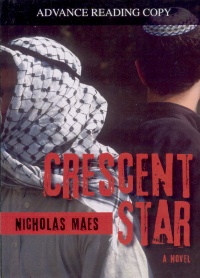| ________________
CM . . .
. Volume XVII Number 15. . . .December 10, 2010 
 |
Crescent Star.
Nicholas Maes.
Toronto, ON: Dundurn, 2011.
266 p., pbk., $12.99.
ISBN 978-1-55488-797-2.
Grades 8-11 / Ages 13-16.
Review by Ann Ketcheson.
*** /4
Reviewed from Advance Reading Copy.
|
| |
|

excerpt:
The Israelis were drinking soda at the makolet. No one had spoken since they had left the field and the only sound audible was the occasional psst of a can being opened.
"I know what's in that hangar," Erez spoke, motioning to the building across the street from them.
"What?" Ilan said.
"It's where they hide dupes like Yossi who think we'll one day be at peace with the Arabs."
------------------------------
The Palestinians were on Al Wad Road and enjoying a celebratory soda together. They were sitting and enjoying their triumph in silence and the only sound audible was the occasional psst of a can being opened.
"I know what's behind that doorway," Mahmoud spoke, motioning to the building across the lane from them.
"What?" Amir asked.
"It's where they stick idealists like Rami who think we'll one day be at peace with the Jews."
Avi Greenbaum is a 15-year-old Jew living in West Jerusalem. Moussa Shakir is a 15-year-old Palestinian living in East Jerusalem. Although they meet on a couple of occasions during organized Arab-Israeli soccer matches, the boys don't get to know each other and lead totally separate lives.
The parallels between the two are many. They are the same age and both love soccer. Both have fathers who are absent, although for very different reasons. Both admire their elder brothers and have a keen sense of duty to their family. Both are all too aware of the region's politics as they listen to people around them argue and as they hear news stories about suicide bombings, police operations and the ever-increasing likelihood of war. Yet Moussa cannot understand why he rarely seems to feel angry toward the Israelis, why he has no fire. And Avi thinks he has no real courage and must constantly strive to overcome his "nerves of cheese."
Author Maes undertakes a subject which requires both insight and delicacy as he introduces readers to daily life in modern Jerusalem. The book is set in 2006, but the decades-old conflict remains substantially unchanged. As Maes says in his introduction to the novel, "I start with the general assumption... that there is good reason for the Israelis to treat the world with suspicion, and good reason for the Palestinians to resent the Israelis." (page 9) Through his two young protagonists, Maes presents a balanced view, neither condemning nor applauding but helping readers understand a complex and confusing region.
Both boys sense that with patience and hard work there might be a slim chance of something approaching peace. Neither feels a compulsion to actively take part physically or verbally when tensions are high. However, there is enormous pressure from peers, from family, and from educators to face the reality that they have left behind childhood and must soon be ready to embrace joining the army and taking an active role in what is perceived as the 'world of men.' This is a coming-of-age novel where young men are, sometimes literally, pushed over the edge into adulthood whether or not they feel prepared. Some of Maes's characters represent the voices of calm and compromise, but they can barely be heard over the ever-present mutterings of aggression.
In his effort to portray both the crescent and the star, that is the boys on parallel paths which, by definition, can never meet, Maes risks becoming predictable in parts of the novel. There is a wedding in Avi's family, and within just a few pages, readers are witnessing a wedding in Mousssa's family. Avi sees a suicide bombing in Iraq on the news, and, within two pages, Moussa sees the same telecast, and on it goes. Perhaps the parallels could have been illustrated without using identical examples in so many cases. This strains credibility and, as mentioned above, becomes too easily anticipated by readers.
Young readers will gain various insights from this novel. On one level, they will watch teens with similar interests and frustrations as they deal with day-to-day life. However, any similarly stops there as our Canadian teens don't deal with security walls and the constant threat of wars which result only in ongoing tension and stalemate rather than any lasting peaceful solution. Readers will gain an understanding of, and hopefully sympathy for, characters caught in a struggle whose origins had nothing to do with them but in whose outcome they will undoubtedly play a role. Maes helps readers decipher some of the puzzle that is the Arab-Israeli conflict by introducing them to Hamas and Hezbollah, familiarizing them with places such as Gaza and Lebanon, and providing a glossary of both Arabic and Hebrew words which are used throughout the book. He has a gift for vivid description which places readers in a world which is foreign both politically and geographically and yet which illustrates both the best and the worst of the human condition. Like the cat at the beginning and the end of the novel, we may not intellectually grasp all of the details, but we can certainly sense the continuing anger and resentment at being powerless to change the situation.
Recommended.
Ann Ketcheson is a retired teacher-librarian and teacher of high school English and French who lives in Ottawa, ON.

To comment
on this title or this review, send mail to cm@umanitoba.ca.
Copyright © the Manitoba Library Association. Reproduction for personal
use is permitted only if this copyright notice is maintained. Any
other reproduction is prohibited without permission.
NEXT REVIEW |
TABLE OF CONTENTS FOR THIS ISSUE
- December 10, 2010.
AUTHORS |
TITLES |
MEDIA REVIEWS |
PROFILES |
BACK ISSUES |
SEARCH |
CMARCHIVE |
HOME |
